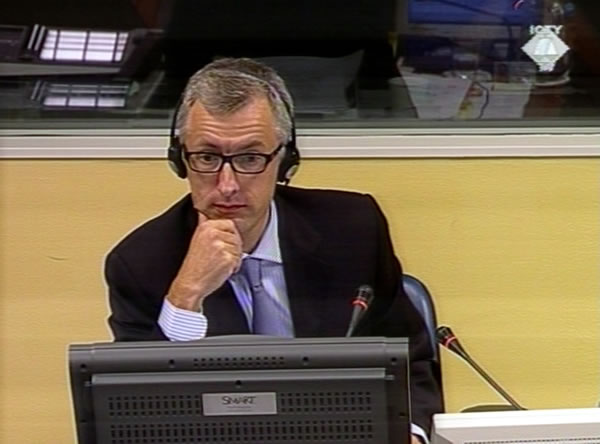Home
VOLUNTEERS WERE ARRESTED TOO LATE
On the second day of his cross-examination at the Stanisic and Simatovic trial, prosecution military expert Reynaud Theunens stuck to his claim that in early 1990s the Serbian police tolerated the actions of paramilitary groups. Theunens recalled that the first arrests of the Serbian Radical Party volunteers took place only after Vojislav Seselj and Slobodan Milosevic parted ways politically
 Reynaud Theunens, witness at the Jovica Stanisic and Franko Simatovic trial
Reynaud Theunens, witness at the Jovica Stanisic and Franko Simatovic trial On the second day of his cross-examination by Jovica Stanisic’s defense, prosecution military expert Reynaud Theunens mostly discussed legal provisions that allowed (or not) the Serbian police to deal with the paramilitary groups formed in early 1990s. Jovica Stanisic, former chief of the Serbian state security service, is on trial together with his assistant Franko Simatovic for his part in the effort to establish, arm and train the police and paramilitary groups that perpetrated crimes against non-Serbs in Croatia and BH.
In his expert report on the role of the two accused in the war, the Belgian expert stated that under the Law on Defense and the Constitution of the Republic of Serbia, the police was obliged to prevent the activities of all units formed without the permission of the state bodies. ‘Arkan’s men’, Captain Dragan’s special unit and members of the various party armies like ‘Seselj’s men’ or the Serbian Renewal Movement volunteers were among them. Instead of doing their job, the police were at best benevolent about their existence and often the police actually controlled the paramilitary groups and supplied them with arms and equipment, Theunens contends.
Defense counsel Jordash put it to the witness that there was no law that allowed the Serbian MUP to deal with the paramilitary formations: they were recruited and put together in the Serbian territory but were then sent to neighboring countries. The witness then brought up the address by Radovan Stojcic Badza, assistant interior minister, before the Serbian parliament in which he told the MPs about the arrest of Dragoslav Bokan in Belgrade for illegal possession of arms. Bokan was the commander of the paramilitary unit called the White Eagles. According to Theunens, this meant that the MUP had the power to arrest the volunteers but, apart from Bokan’s case, mostly failed to do it.
Moreover, as the witness noted, the arrests of the Serbian Radical Party volunteers, again for illegal possession of arms, started in 1993 when the Radical leader Vojislav Seselj parted ways politically with the Serbian president Slobodan Milosevic. Until then, the existence of the volunteers was tolerated. According to Theunens, this shows that the police ‘enforced law selectively’.
In his expert report, the witness used a document from the SFRY’s Federal Secretariat of National Defense in which the Serbian state security service was told about the crimes against Croats in the occupied territories in Croatia, which were divided into several so-called Serb autonomous regions in the fall of 1991. As the defense lawyer noted, the report did not quote what the Serbian secret service responded: that the military prosecution was in charge of the army personnel, that some individuals had been prosecuted and that Vojin Vuckovic Zuca, a paramilitary group leader, had been arrested for illegal possession of arms. Theunens admitted that he could have included the response in his report too. However, his intention was only to show that the state security service was kept abreast about the crimes, Theunens said.
The cross-examination continues tomorrow and will be completed next week.
Linked Reports
- Case : Stanisic & Simatovic
- 2010-10-26 STATE SECURITY UNDER THE WATCHFUL EYE OF MILITARY SECURITY
- 2010-10-04 BRIEFING WITH FRENKI
- 2010-09-23 ALL THE BEST FOR YOUR JOINT CRIMINAL ENTERPRISE
- 2010-10-29 STANISIC WASHES HIS HANDS OF SESELJ’S MEN
- 2010-11-01 DID POLICE VIOLATE CITIZENS’ RIGHT TO DEFENSE?
- 2010-11-02 SIMATOVIC’S DEFENSE: ‘POLICE DIDN’T CONTROL VOLUNTEERS’
